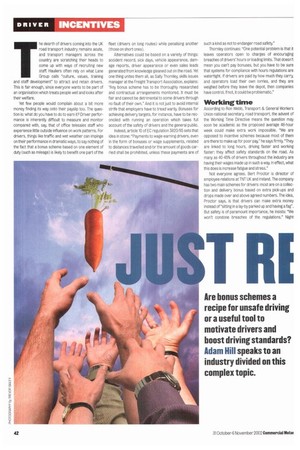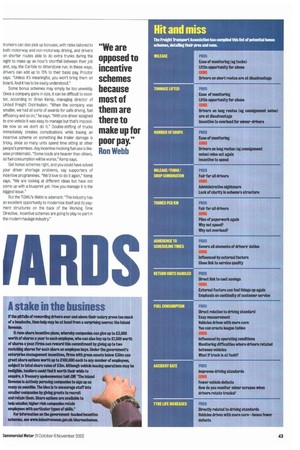T he dearth of drivers coming into the UK road transport
Page 42

Page 43

If you've noticed an error in this article please click here to report it so we can fix it.
industry remains acute, and transport managers across the country are scratching their heads to come up with ways of recruiting new staff. Hauliers often rely on what Lane Group calls "culture, values, training and staff developmentto attract and retain drivers. This is fair enough, since everyone wants to be part of an organisation which treats people well and looks after their welfare,
Yet few people would complain about a bit more money finding its way onto their payslip too. The question is: what do you have to do to earn it? Driver performance is inherently difficult to measure arid monitor compared with, say, that of office telesales staff who experience little outside influence on work patterns. For drivers, things like traffic and wet weather can impinge on their performance in dramatic ways, to say nothing of the fact that a bonus scheme based on one element of duty (such as mileage) is likely to benefit one part of the fleet (drivers on long routes) while penalising another (those on short ones).
Alternatives could be based on a variety of things: accident record, sick days, vehicle appearance, damage reports, driver appearance or even sales leads generated from knowledge gleaned out on the road. Yet one thing unites them all, as Sally Thornley, skills issues manager at the Freight Transport Association, explains: "Any bonus scheme has to be thoroughly researched and contractual arrangements monitored. It must be fair and cannot be detrimental to some drivers through no fault of their own." And it is not just to avoid internal strife that employers have to tread warily. Bonuses for achieving delivery targets, for instance, have to be reconciled with running an operation which takes full account of the safety of driver's and the general public.
Indeed, article 10 of EC regulation 3820/85 sets that idea in stone: "Payments to wage-earning drivers, even in the form of bonuses or wage supplements, related to distances travelled and/or the amount of goods carried shall be prohibited, unless these payments are of such a kind as not to endanger road safety."
Thornley continues: "One potential problem is that it leaves operators open to charges of encouraging breaches of drivers' hours or loading limits. That doesn't mean you can't pay bonuses, but you have to be sure that systems for compliance with hours regulations are watertight. If drivers are paid by how much they carry, and operators load their own lorries, and they are weighed before they leave the depot, then companies have control, if not, it could be problematic."
Working time
According to Ron Webb, Transport & General Workers Union national secretary, road transport, the advent of the Working Time Directive means the question may soon be academic as the proposed average 48-hour week could make extra work impossible. "We are opposed to incentive schemes because most of them are there to make up for poor pay," he says firmly. "They are linked to long hours, driving faster and working faster: they affect safety standards on the road. As many as 40-45% of drivers throughout the industry are having their wages made up in such a way. In effect, what this does is increase fatigue and stress."
Not everyone agrees. Bert Proctor is director of employee relations at TNT UK and Ireland. The company has two main schemes for drivers: most are on a collection and delivery bonus based on extra pick-ups and drops made over and above agreed numbers. The idea, Proctor says, is that drivers can make extra money instead of "sitting in a lay-by parked up and having a fag". But safety is of paramount importance, he insists: "We won't condone breaches of the regulations." Night
trunkers can also pick up bonuses, with rates tailored to both motorway and non-motorway driving, and drivers on shorter routes able to do extra trunks during the night to make up an hour's shortfall between their job and, say, the Carlisle to Atherstone run. In these ways, drivers can add up to 15% to their basic pay, Proctor says. "Unless it's meaningful, you won't bring them on board. And it has to be easily understood."
Some bonus schemes may simply be too unwieldy. Once a company gains in size, it can be difficult to monitor, according to Brian Kemp, managing director of United Freight Distribution. "When the company was smaller, we had all sorts of awards for safe driving, fuel efficiency and so on," he says, "With one driver assigned to one vehicle it was easy to manage but that's impossible now so we don't do it." Double-shifting of trucks immediately creates complications while basing an incentive scheme on something like trailer damage is tricky, since so many units spend time sitting at other people's premises. Any incentive involving fuel use is likewise problematic. "Some loads are heavier than others, so fuel consumption will be worse," Kemp says.
Gat bonus schemes right, and you could have solved your driver shortage problems, say supporters of incentive programmes. "We'd love to do it again," Kemp says. 'We are looking at different ideas but have not come up with a blueprint yet. How you manage it is the biggest issue."
But the TGWU's Webb is adamant: 'The industry has an excellent opportunity to modernise itself and its payment structures on the back of the Working Time Directive. Incentive schemes are going to play no part in the modem haulage industry."




























































































































































